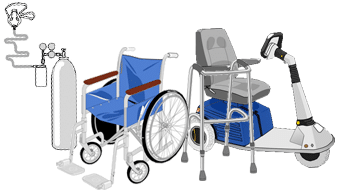by: James Fleming
The ever-growing cost of healthcare is rarely more prevalent than in the price tag associated with home medical equipment. If you are in need and looking to save money, don’t miss this quick guide:
What is Durable Medical Equipment?
Often referred to by its acronym, DME, durable medical equipment is any tool or device that generates therapeutic benefits for a patient with a diagnosed medical condition or illness. DME is durable which means it can withstand ongoing re-use and can be utilized in the home. Some examples of DME include:
- Mobility aids like a knee walker scooter, cane, or wheelchair
- Hospital beds
- Pressure mattresses
- Nebulizers
- Oxygen equipment
- Hoyer lifts
- Kidney machines
If you or a loved one experienced an immobilizing injury as the result of a fall, a wheelchair or walker may be prescribed by your doctor. That type of equipment qualifies as DME. One of the most important aspects of DME, at least when it comes to insurance coverage, is that the equipment would be of no use to you if you did not have your medical condition.
How to Save on Durable Medical Equipment?
When it comes to purchasing or leasing DME, pretty much every piece of equipment is available at a retail price for someone looking to pay out of pocket. The costs can be astronomical, however, which is why it is important to either get it covered by health insurance or find deeply discounted options when possible. Keep these helpful tips in mind when shopping:
Get a Doctor’s Order
A prescription from your doctor for a specific assistive device will trigger a process by which insurance connects you with local providers and covers some or all of the cost of the equipment. While the journey from seeing your doctor and receiving the equipment can take anywhere from a couple of weeks to a couple of months depending on the provider and type of device, this is the primary way to save money.
Similar to writing an order for home health care, a prescription for a medical device that aids your specific condition needs to be written by your doctor. In addition to the order, your doctor will also have to provide medical history information and evidence that effectively backs up their recommendation. If approved, an insurance company will have a local medical equipment company contact you in regards to fulfilling the order.
Check a Local Lending Library
You might be surprised to find out that lots of senior-focused organizations like the National Council on Aging and elder resources nonprofits offer free DME lending programs for adults over 65. The programs are donation-based but can be a true asset, especially if you need temporary medical equipment, like crutches.
These types of programs collect gently-used equipment that other people have donated and then clean and repair it as needed for lending. Most often, if you are in need, you can get on a list to be notified when the tool or device you require becomes available. You may be asked to sign a form saying you are borrowing the equipment and will return it when you are finished using it.
Sometimes churches and regional medical resource centers will also offer medical equipment exchange programs so it is definitely worth looking around. Either search online or contact your nearby Council on Aging to see what programs they may know about.
Look Online
In the digital age, it’s no surprise that an array of discounted, quality medical equipment can be found online. Whether it’s on big sites like Amazon or independent DME distributors, your chances of finding the item you need on the internet are high.
When shopping online, make sure to watch out for steep shipping costs and always check product reviews, they can be illuminating and save you an expensive purchase you regret.
Try the Pharmacy
With senior care demand on a rapid rise, more and more pharmacies are taking cues to stock up on home medical supplies that can effectively improve a senior’s quality of life. Everything from mobility aids to bed rails, grab bars, toilet seat risers, transfer benches, overbed tables, even lift chair recliners are available at pharmacies or their online websites.
In addition to purchasing items in-store when they are on sale, one way to save money is to sign up for the store’s rewards program. If you’re going to be picking up prescriptions and medical equipment there, might as well earn rewards points that qualify you for special coupons and cashback the more you shop there. Pharmacies often include you in sweepstakes to earn even bigger savings too simply for completing things like online surveys.